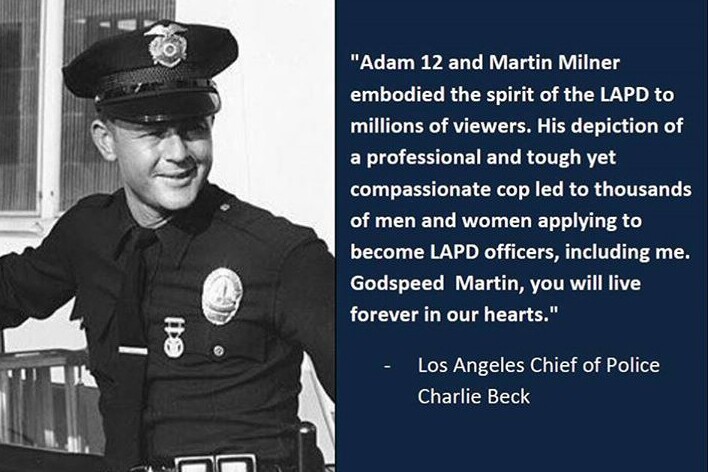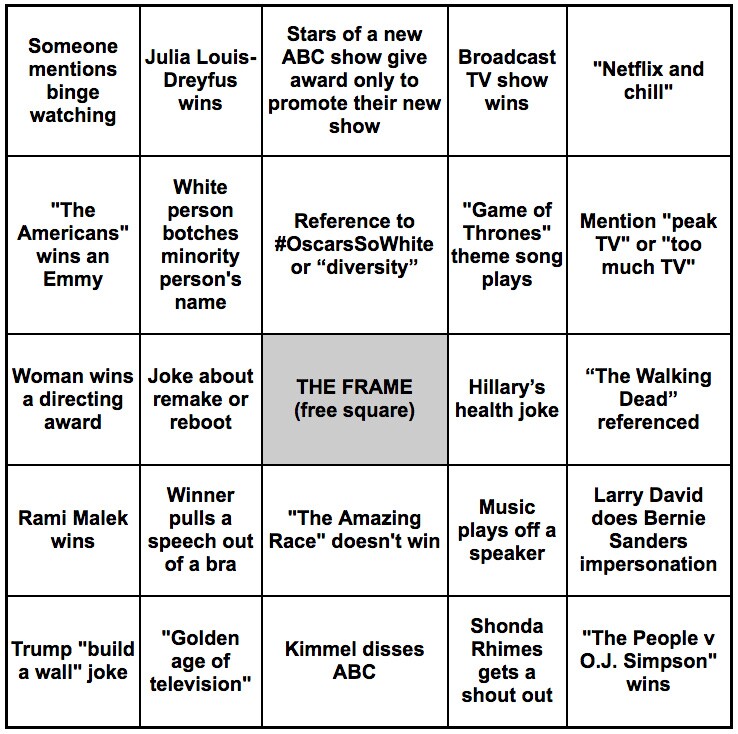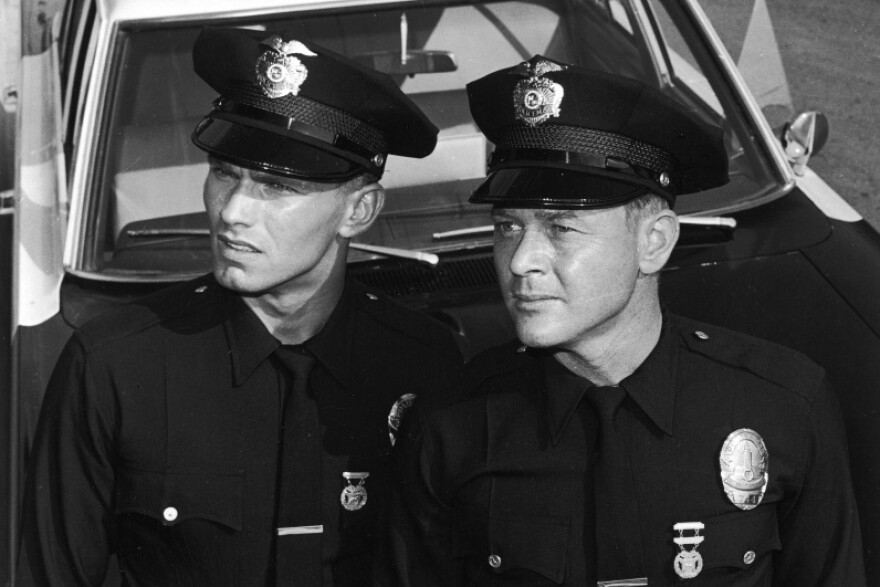As part of our Cops on TV series, we have actor Kent McCord of the 1960-70s TV cop show, "Adam-12," which was produced in partnership with the LAPD. McCord says a show about cops who aren't "edgy" wouldn't sell in today's TV business; In advance of TV's big awards night, we discuss what goes into an Emmy campaign, and how valuable is a nomination or a win in this era of "too much TV"?
How the TV series 'Adam-12' helped the LAPD sell the 'good cop' image
This segment is part of The Frame's #CopsOnTV series about how police are portrayed in both scripted and unscripted television, and how TV can impact the public’s perception of law enforcement. Listen to our other segments on this topic here.
The cop drama "Adam-12" aired on NBC from 1968 to 1975 and was one of the first police procedurals on television.
While other police shows, suchn as "Dragnet," followed detectives solving crimes, "Adam-12" focused on a pair of beat cops doing their everyday jobs — responding to calls and patrolling the sprawling city of Los Angeles
The show was created by Bob Cinader in association with "Dragnet" creator Jack Webb. And it had huge support from the LAPD, which believed the show could help change the public’s negative perception of officers and also help with recruitment.
The late '60s were a politically charged time, with the 1965 Watts riots fresh in the public’s mind, and the Vietnam War still raging. There was a collective feeling of anger at figures of authority, and especially police.
But "Adam-12" depicted two squeaky-clean cops doing their best to fight crime and keep law-abiding citizens safe. They were an idealized version of what a cop should be.
Kent McCord starred as Officer Jim Reed in the series. (His onscreen partner, Martin Milner, died last year.) McCord recently came to The Frame’s studio to talk with John Horn about how the producers of "Adam-12" collaborated with the LAPD, and what made the show unique.
This is just a partial transcription, click the play button to hear the full interview!
Interview Highlights:
How did you and your writers collaborate with LAPD officials?
They'd give a writer an assignment and say, We haven't done an interesting 211 [police code for a burglary]. They'd assign a sergeant to this writer, the writer would go out and ride along, talk to cops and come up with story ideas..."Adam-12" was also unique in that it was a vignetted show. There wasn't just one incident [with] a beginning, middle and an end. It was portraying as much as you could in a half-hour what a typical watch would be. Two guys in a black-and-white in the streets of Los Angeles doing what two guys in a black-and-white in the streets of Los Angeles do, period. We weren't out to solve the social ills of the day, we were there to portray two good human beings doing the job. There were officers we portrayed who went over the line, they generally weren't either one of us. I think in that we became two ideals.
When you were working on an episode, would the LAPD consult on the script? How heavy a hand would they have in the creation and depiction of these two officers?
We had the freedom to do whatever dramatically we wanted to do. We had a technical advisor working with us every day that we shot the show. Once we left the car, they'd say: You do the approach this way, to this automobile where there's this suspected felon. And, interestingly enough, during the whole run of "Adam-12," episodes of the show were being bicycled all over the country to police departments to be used as training videos. Long before videos, they were still shipping 16mm films. So the show, in that sense, had that authenticity with it.
If I were to put on a police uniform, that's illegal. Were you very strict about when and where you could wear it?
Oh were we ever...The buttons [had] Los Angeles Police written on the buttons. The badges were real badges, and the guns were real and we didn't even have plugs in them those days. We always had blanks, but in a revolver in those days, if you pointed the gun you could see the shell at the end of it. So any time we left the set, we'd hand over the badge, we handed over the gun. They were very very strict about that. By the way, we were one of the first shows to really go out and use practical locations [in L.A.]. We'd be sitting there in a black-and-white, two guys in uniform, and people would pull up and say, Hey, you guys there's a thing happening! And we'd have to say, Go call a cop — we're only actors! This would happen time and time again.
On your website you have this amazing letter that your creator Bob Cinader sent to an ad agency. Here's what he says in the letter: "Like all major police departments throughout the country, the LAPD's two biggest problems are recruitment and community relations, they feel that a series about the uniformed police officer would be of even greater help to them in particular and the cause of law and order in general." That's something you don't typically hear around an entertainment show, that there is a partnership here between the show and the LAPD and it's going to serve the LAPD as much as it's going to serve the audience.
I think that there's a responsibility often shunned by our industry about the effects that make-believe has on the public. One of the things that I have witnessed for the last, coming up on 50 years now, is the response from police officers in the street. I get it to this day. There is something called the typifying nature of film, where it takes you out of the individual and makes you the typical. Marty [Milner] and I became the typical cops in American, which were identifiable to people as being good, decent human beings. There are exceptions, but we represented, I believe, the 99 percent of the police officers who are out there doing a daily job and a dangerous job. I've seen shows where you have police officers having to drink or take dope to do the job. My suggestion to those police officers is: go get another job.
I think that the conversation around policing in the country now is very different than when your show came on the air.
Well, I'm not so sure we haven't come full circle. We had the Watts riots in 1965, we had the police riot in Chicago during the 1968 Democratic convention, we had the Vietnam War raging. Police officers in this country were the first line of the establishment. In that instance they were pigs, you had Kent State, even though that was the National Guard, you still had a symbol of authority ... In any profession in this country, there's the bad, but the vast majority are good. And when you paint with a broad brush, and you say the individual actions of any one of any group stands for all of them, you're making a huge mistake. It's the same kind of prejudice that you're applying to an entire class of people that you wouldn't apply to any race or religion.
If you took a show like "Adam-12" today and pitched it to a TV network or cable channel, what do you think the response would be?
Well, I can tell you what the response would be because I spent the last six months trying to do something with this. The response is: Can we make them edgier? To me that's the mistake that's happening here.
What are they after?
If I had the answer to that I would sell it. But I can tell you this: I would rather have the two police officers from "Adam-12" show up at my front door when I needed help, or my child was missing, than the majority of the characters that I've seen portrayed on TV doing law enforcement work over the years since we did the show.
Here is what LAPD Police Chief Charlie Beck said at the funeral of your co-star Martin Milner:

Is that important to you?
It's a very, very humbling kind of responsibility that we took very seriously. Jack Webb said, If you get pulled over, do not try to talk yourself out of whatever you're being pulled over for because it'll go through this department like wildfire. Jack understood the responsibility. It was unique in the annals of TV that they had the seal of the LAPD on "Dragnet," we had the seal of the police, "Emergency!" had the seal of the fire department, and "CHiPs" had seal of the Highway Patrol. [Today's] shows don't want [to] receive the seal because they think they have to give up something. But I think what you get in receiving that you gain in authenticity.
Did you ever get pulled over as a civilian and not get ticketed because the police officer recognized you and gave you a pass?
Once I was going over Laurel Canyon and got pulled over by a motor officer. He was standing, straddling his bike looking at me with his arms crossed. I said, I'm wrong, write me the ticket, hearing Jack Webb's voice in my head. The guy said, After everything you've done for us? And he took off.
Why the Emmys are more important than ever—cutting through the TV clutter
On September 18th, stars of the small screen will gather to toast themselves and the television industry which has taken over the town– and in some ways eclipsed the movie business.
It's the the 68th annual Prime-Time Emmy Awards. But what does an Emmy nomination mean? And what lengths will networks, cable channels and streaming services go to win one? Finally, compared to the Oscars, why do so few people actually watch the Emmy telecast?
To break it all down, we invited two TV reporters on The Frame:
, who writes for Esquire, Variety and Vulture and
, who covers TV and the media business for the Los Angeles Times.
You can hear the full conversation by clicking the play button at the top of the page or read highlights below.
Roundtable Highlights:
On why Emmys are more valuable than ever:
BATTAGLIO: Years ago, a show could win an Emmy and that was nice, but it was really more important that show was in the top ten in the Nielsen ratings. It has completely changed. The Emmys are more important than ever for the television business. And I'll tell you why: the business has changed so much. It's so fragmented. We have all these new platforms now. You need awards, and you need the biggest award of all – the Emmy– to sustain your program, to get it in front of the public. There are going to be so many shows that get exposure on the Emmys Sunday night that people have never heard of.
On how networks woo Emmy voters:
FRIEDLANDER: My husband happens to be an Emmy voter... The amount of screeners that come to our house in Emmys season is staggering. He actually got a box set of all the Netflix new shows that came out. And it was five boxes that actually spelled out N-E-T-F-L-I-X, and it took over our table.
On how streaming services give critically-loved but little-watched shows a shot at an Emmy:
FRIEDLANDER: Vince Gilligan always famously said that he owed a lot of the success [of] "Breaking Bad" to Netflix because it started streaming that show and it started getting a lot of attention. A show like "The Americans," which has been a fan favorite, although sadly not very high-rated, is finally getting the recognition this year after so many seasons dying on FX, but getting more attention on streaming services.
BATTAGLIO: It's not like, "Ok, I saw that show won an Emmy. I'll watch it when the new season comes on in September." That's not it. What happens now is that you can find that show immediately. You can go to Netflix or you can go to iTunes or Hulu or all these streaming services and immerse yourself in that show immediately.
To make your Emmy watching more fun, The Frame has created an interactive Emmy bingo card:

On why the Emmy telecast isn't as popular as other awards shows:
FRIEDLANDER: It's possible they're sick of TV!
BATTAGLIO: The ratings are not as big as the Grammys or the Oscars or some of the other major live trophy shows, but relatively, it's pretty large. If I have a show that's streaming on Amazon that maybe people haven't heard of, and yet it's getting 12 to 15 million people watching [about it on the Emmys] on ABC. That's a lot bigger than I had before my show was nominated for an Emmy.
The Emmys air Sunday, September 18th on ABC 7pm EST, 4pm PST. To get more of The Frame, subscribe to our podcast on iTunes.




